How to plant amaryllis bulbs in pots: expert tips for these festive flowers
Learning how to plant amaryllis bulbs will reward you with stunning indoor blooms this winter – and it's easy once you know how
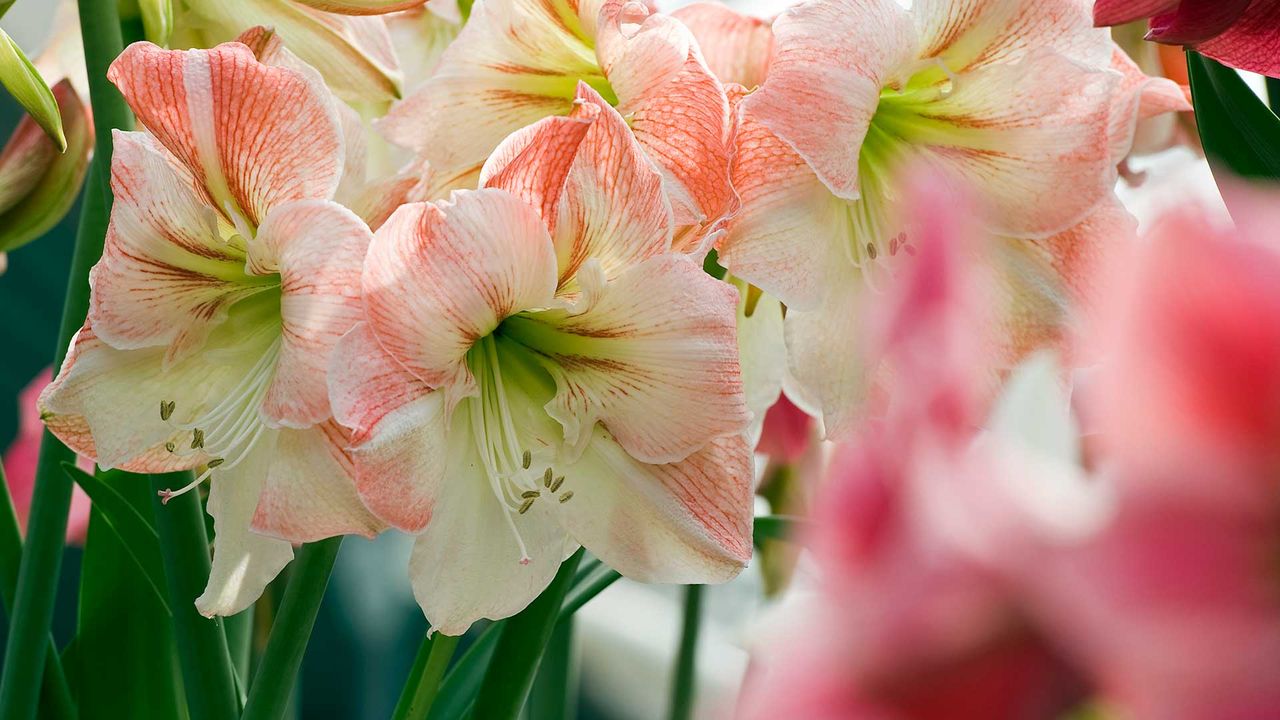

If you want to bring vibrant blooms into your home this winter, knowing how to plant amaryllis bulbs in pots should definitely be on your to-do list. These glorious, trumpet-shaped flowers are some of the best for growing indoors, and with a few expert tips, it's easy.
Like all indoor plant care, there are a few factors to take on board to ensure these beauties thrive. These include planting them at the right depth and using a suitable potting mix. Timing is important, too: get it right, and you can incorporate amaryllis into your Christmas decorating ideas.
We spoke to plant-care professionals to get the lowdown on everything you need to do to enjoy a fabulous display this winter. They also share some of their recommended varieties below.
How to plant amaryllis bulbs in pots – the key tips you need to know
Plants grown from bulbs lift the spirits during shorter, chillier days, and amaryllis are no exception. "Available in a range of colours from classic reds, soft pinks and creamy whites, these flowers add a lively touch to any setting," says Claire Hooper of Hillier Garden Centres.
Just remember to keep these plants safely out of reach of pets – they are toxic to both cats and dogs.
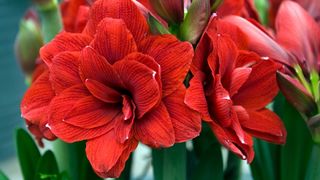
Red varieties bring festive cheer

Claire's role includes overseeing the day-to-day running of the plant area, as well as managing the plant team. Her love of plants extends further than the workplace; Claire is a passionate allotment holder and spends much of her free time tending to her plot and garden.
When to plant amaryllis bulbs
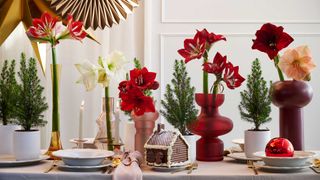
Amaryllis can flower over the Christmas holidays if you plant them early enough
The first step in learning how to plant amaryllis bulbs in pots is getting the timing right.
Like when planting spring bulbs in your garden, amaryllis are usually planted in the autumn. However, you can plant them in December, too.
Sign up for the woman&home newsletter
Sign up to our free daily email for the latest royal and entertainment news, interesting opinion, expert advice on styling and beauty trends, and no-nonsense guides to the health and wellness questions you want answered.
They should bloom seven to ten weeks from planting, notes gardening expert Sarah Raven. Keeping this timeframe in mind can help you decide when exactly to plant your bulbs, depending on when you want to enjoy their blooms. "I tend to plant them in October for blooms at Christmas or early in the new year," Sarah says.

Since the publication of her first book, The Cutting Garden, Sarah Raven has led the way in introducing a new kind of productive gardening. Her aim is to create intense colour and beauty with a practical and easy-to-achieve approach. Sarah’s love of gardening extends to all areas, from growing cut flowers and delicious vegetables from seed to designing stunning gardens packed full of variety, colour, and scent.
Choosing your bulbs
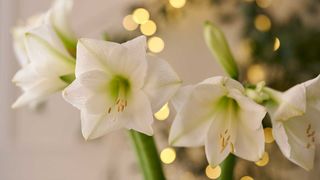
Always pick good quality bulbs
"When selecting amaryllis varieties to plant, there are many options that can bring beauty and charm to your home," says Claire Hooper. She recommends "Royal Velvet", which makes a dramatic focal point with its velvety red blooms. Meanwhile, a few of Sarah Raven's favourites include the "delightfully glamorous and dark-red ‘Benfica’," as well as "Giraffe", which has red-striped petals.
Gardening expert and Gardena ambassador Lynne Lambourne adds, "If red isn’t your thing, then go for a more sophisticated simple white bloom, like the 'White Christmas'." At Woman & Home, we also like the "Akiko" variety, available from Crocus, which has white double blooms.
Whatever types you choose, it's important to shop for good quality bulbs – something to remember when picking bulbs to plant for spring flowers in your garden, too. If shopping in person, gardening expert Mark Lane of Stannah recommends picking ones that are firm, large and free from soft spots or mould.

Gardena sustainability ambassador and warrior on waste, Lynne Lambourne inspires sustainable living through her gardening. She teaches people to rethink their garden spaces, including using their gardens to grow their own food, increase biodiversity, and help the climate crisis.

Not only is Mark a presenter on BBC's Gardeners' World, but he is also an accredited gardening expert at stairlift and homelift company Stannah. Mark also runs his own gardening business, when not providing useful tips and tricks for blossoming green thumbs.
How to plant amaryllis bulbs
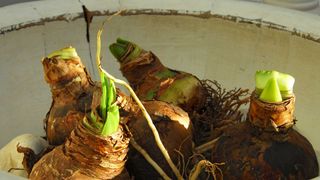
Amaryllis bulbs are prone to rot, so ensure they have plenty of drainage
"Plant amaryllis in rich and exceptionally well-drained soil," says Sarah. "I recommend a mix of one part well-rotted manure, one part horticultural grit or sand, and two parts leafmould. Alternatively, two parts good compost mixed with one part grit works fine."
Remember to choose a pot with drainage holes, too. "A saucer or drip tray under the pot will help catch excess water and protect indoor surfaces," adds Mark. The pot should also be relatively tight-fitting around your bulb. Sarah recommends leaving around one inch between the bulb and the pot’s sides and a depth of at least 30cm (one foot) to allow room for good root growth.
"Plant the shoulder of amaryllis bulbs a third above the surface of the pot’s compost," Sarah instructs. "The apex is the most susceptible section to rotting as water can seep in and decay the heart, so this part must not sit on wet soil."
Lynne adds: "Make sure it’s facing the right way up – the sprout should be at the top, while the roots are in the soil and pointing towards the bottom."
Top tip: Once you've planted your amaryllis bulb, Lynne recommends topping the compost with broken-up seashells. This will add a source of calcium to the soil and provide great nutrition for the plant, she says.
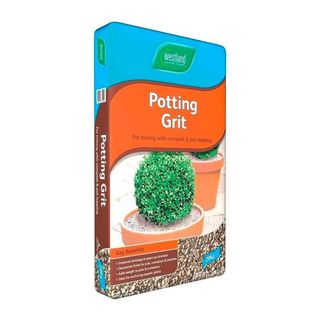
Improve drainage when potting up amaryllis and other bulbs with this well-rated potting grit.
How to care for amaryllis plants
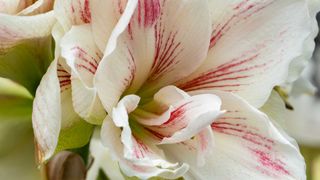
Water your amaryllis when needed to keep it healthy
Sarah says, "Leaving amaryllis in the shade will impact flowering, so place them somewhere bright, but not in harsh, direct light."
Knowing how to water plants is also important, and with amaryllis, you'll want to avoid letting the potting mix completely dry out. Sarah warns against overwatering them, though, as this can lead to bulb rot and a lack of leaves and flowers.
"Some amaryllis are prone to falling over because they reach over 60cm (2ft) tall and can be very top heavy," she adds. "Prevent this by staking them with a cane in the compost and tying in the stem." You can buy decorative amaryllis supports from the Sarah Raven shop.
It's also worth rotating the pot daily, as Mark advises. This will help the blooms open evenly and avoid leaning. "If properly cared for, amaryllis flowers can last for up to two weeks or more, filling your home with stunning colour and visual appeal," he says.
FAQs
Can you grow amaryllis outdoors in winter?
Amaryllis are tender perennials, so you need to keep them indoors over winter to protect the plants from frost. You can, however, pop them on your patio during summer (see below), although they won't be blooming at this time.

Amaryllis are grown indoors over winter
What should you do with amaryllis bulbs after they've flowered?
These alluring plants are perennial, which means they will flower year after year if you care for them correctly.
Once the blooms have faded in spring, cut the flower spike back but leave the foliage to continue feeding the bulb. Keep watering the plant, and fertilise every week or so with a balanced liquid plant food. Once temperatures have warmed, you can place your amaryllis outdoors.
In autumn, bring it back indoors and keep it somewhere cool for a couple of months. You want the bulbs to enter a semi-dormant state, so cut back on watering and stop feeding to encourage this.
After the two months are up, cut back any dead leaves and start watering your bulb again, in preparation for new blooms.
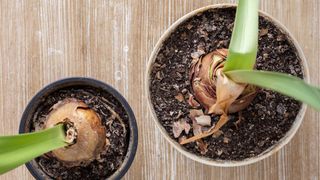
An amaryllis bulb can flower for many years with the right care
Now you know how to plant amaryllis bulbs in pots, why not turn your attention to planting bulbs for your outdoor space, if you haven't already? Learning how to plant tulips is a great place to start for a spectacular springtime show.

The garden was always a big part of Holly's life growing up, as was the surrounding New Forest where she lived. Her appreciation for the great outdoors has only grown since then; she's been an allotment keeper, a professional gardener, and a botanical illustrator. Over three years ago, Holly started writing about plants and outdoor living full-time, first for Gardeningetc.com and now for popular lifestyle titles such as Homes & Gardens.
-
 Holly Willoughby's camo mini skirt, khaki tee and stylish hiking boots just perfected 'glamourflage' dressing
Holly Willoughby's camo mini skirt, khaki tee and stylish hiking boots just perfected 'glamourflage' dressingHolly proved why khaki and camouflage are trends we should be into with in her mini skirt with chunky boots
By Caitlin Elliott Published
-
 Julianne Moore mastered wearing barrel leg jeans last spring - and her styling trick has never been more relevant
Julianne Moore mastered wearing barrel leg jeans last spring - and her styling trick has never been more relevantA lesson in balancing proportions - this is how to make statement denim look refined and sophisticated.
By Molly Smith Published